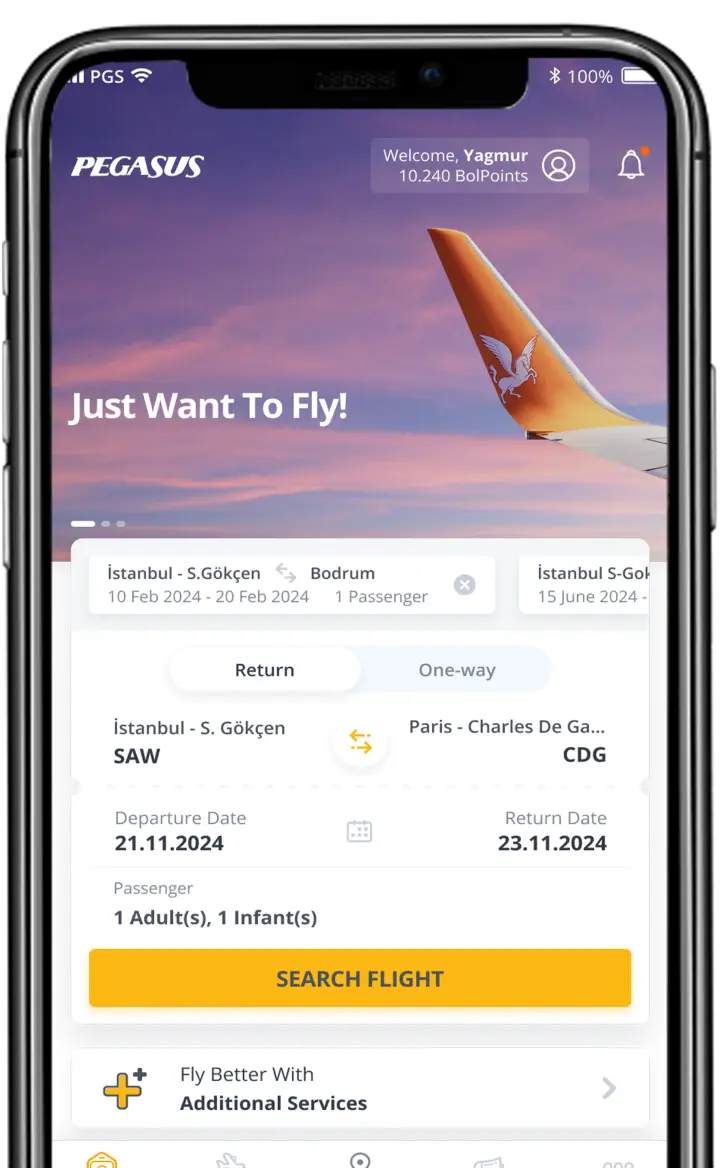Pegasus Airlines operated its first SAF Domestic flight in Türkiye
Last Modified : 10 June 2022
Pegasus Airlines operated its first SAF Domestic flight in Türkiye
Managing its operations and activities with a “sustainable environment” approach, Pegasus Airlines operated its first domestic flight between Izmir Adnan Menderes Airport and Istanbul Sabiha Gökçen Airport on Tuesday, 1 March 2022 using Sustainable Aviation Fuel (SAF). Procuring SAF fuel originating from Neste Corporation, supplied by Petrol Ofisi, Pegasus is operated daily domestic flights from Izmir in March with SAF.
“Reducing the carbon footprint of the aviation industry is critical”
Pegasus Airlines CEO Mehmet T. Nane stated that reducing the carbon footprint originating from the aviation industry is of critical importance on the road to sustainable aviation and said: “In line with the Paris Climate Agreement, to which Türkiye is a signatory, a 50% reduction in carbon emissions is the target by 2030. One of the important factors that can make this possible is to increase the use of Sustainable Aviation Fuel. Since 2019, we have been operating some of our international flights with SAF. We have now extended it to include our domestic flights in Türkiye through our cooperation with Petrol Ofisi. As Pegasus Airlines, we are delighted and proud to have operated our first domestic flight with SAF, which has lower carbon emissions and is produced from environmentally friendly and sustainable sources.” He continued: “Our mid-term plans focus on our fleet transformation and offsetting projects, while our long-term projects involve new technology aircraft and carbon capture technologies. In line with our commitment to IATA’s “Net Zero Carbon Emissions by 2050” resolution, we will continue to work tirelessly in support of sustainable aviation.
Petrol Ofisi serves for today and the future with its advanced technology products
Emphasising Petrol Ofisi’s leading position in its sector with its outstanding product and service quality in every field, Petrol Ofisi Selim Şiper said, “We offer advanced solutions to meet the needs of today and the future with our advanced technology products that reflect our sustainability approach in marine and aviation fuels as well as land. Since 2019, with our new generation Active-3 technology fields, we have been offering fuels that clean the engines of automobiles and commercial vehicles, extend their lifespan, and minimise emissions with higher performance and fuel savings. Similarly, we supplied the first batch of the new generation Very Low Sulphur Fuel Oil – VLSF in Türkiye in October 2019, within the framework of the IMO criteria established in accordance with global sustainability goals in the marine industry. With our own brand of aviation fuels, PO Air, we are a member of IATA and supply an aviation refuelling service at 72 airports in Türkiye, as well as providing an international standard service to more than 200 airlines. We also support the aviation industry with our extensive infrastructure, high HSSE standards, our experience and expertise, and provide an uninterrupted service to more than 250,000 aircraft each year under our principle of zero errors and zero delays. As one of the most important assets and a sector leader of our country emerged from this nation, we consider it as our duty to make a positive contribution to Türkiye today and in the future, as we have done so in the past. Therefore, we are proud and delighted today to be supplying Pegasus Airlines, one of the greatest assets of our country’s aviation industry, with Sustainable Aviation Fuel (SAF) for their first domestic flight.
The path to sustainable aviation
Operating its first domestic flight in Türkiye with SAF, a sustainable version of Jet A and Jet A-1 fuels, and a cleaner alternative to fossil jet fuels, Pegasus also carries out many other projects on the path to sustainable aviation. In line with IATA’s “Net Zero Carbon Emissions by 2050” resolution and having joined the world’s leading airlines to commit to this target, Pegasus has also set its interim target for 2030. Shaping all its activities in line with this goal, Pegasus estimates savings of between 15 to 17% in fuel consumption compared to the previous generation aircraft, as part of its strategy to transform its entire fleet to Airbus neo type aircraft by 2025. Placing importance on reducing carbon emissions at source, Pegasus also implements a variety of operational measures to achieve this such as transforming to a younger fleet, purchasing lower emission aircraft, reducing aircraft weight and route optimisation. Within the framework of its transparency principle, Pegasus has been publishing flight-related emissions on the investor relations website on a monthly basis since October 2021 and plans all these efforts in tandem with its governance strategy in the field of Sustainability (ESG - Environmental, Social, and Corporate) and in support of its outputs.



